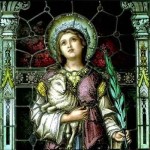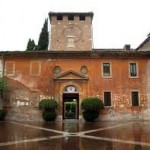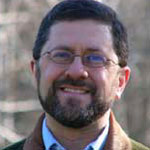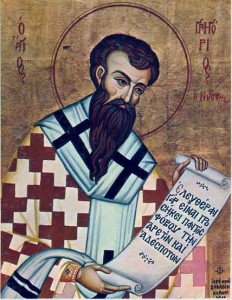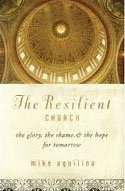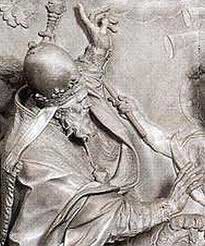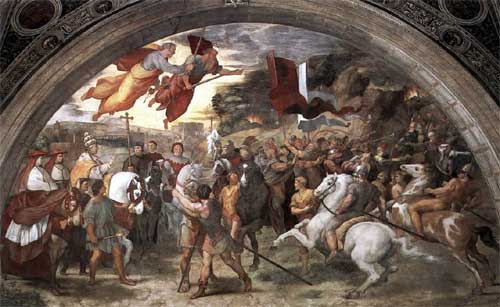Mike Aquilina shares with us the story of St. Agnes.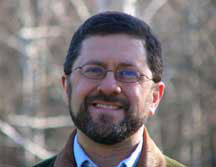
[powerpress]
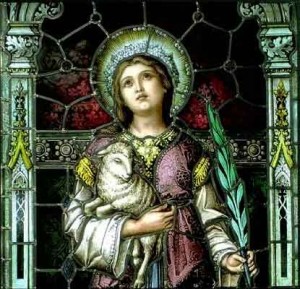 A young girl who would help to break open the hearts of many, so that grace could pour in. She was “a lamb for Christ”.  Mike also discusses the challenges to life, including the “ancient” practice of abortion.
A young girl who would help to break open the hearts of many, so that grace could pour in. She was “a lamb for Christ”.  Mike also discusses the challenges to life, including the “ancient” practice of abortion.
wiki – According to tradition, Saint Agnes was a member of the Roman nobility born c. 291 and raised in a Christian family. She suffered martyrdom at the age of twelveor thirteen during the reign of the Roman Emperor Diocletian, on 21 January 304.
The Prefect Sempronius wished Agnes to marry his son, and on Agnes’ refusal he condemned her to death. As Roman law did not permit the execution of virgins, Sempronius had a naked Agnes dragged through the streets to a brothel. Various versions of the legend give different methods of escape from this predicament. In one, as she prayed, her hair grew and covered her body. It was also said that all of the men who attempted to rape her were immediately struck blind. In another the son of the prefect is struck dead, but revived after Agnes prayed for him, causing her release. There is then a trial from which Sempronius excuses himself, and another figure presides, sentencing her to death. When led out to die she was tied to a stake, but the bundle of wood would not burn, or the flames parted away from her, whereupon the officer in charge of the troops drew his swordbeheaded her, or, in some other texts, stabbed her in the throat. It is also said that the blood of Agnes poured to the stadium floor where other Christians soaked up the blood with cloths. and
The daughter of Constantine I, Saint Constance, was also said to have been cured of leprosy after praying at Agnes’ tomb.
A prayer to St. Agnes
Let us gain courage for our own battle
by honoring the martyrdom of the glorious virgin Agnes.
St. Agnes, vessel of honor,
flower of unfading fragrance,beloved of the choirs of Angels,you are an example to the worth of virtue and chastity.
O you who wear a Martyr’s palm
and a virgin’s wreath,
pray for us that,
though unworthy of a special crown,
we may have our names written in the list of Saints.
Tags: catacomb, fathers mike, hearts, martyrdom, mike aquilina, saint agnes, virgins, virtue
This entry was posted on Monday, January 21st, 2013 at 12:43 am
You can follow any responses to this entry through the RSS 2.0 feed.
[powerpress]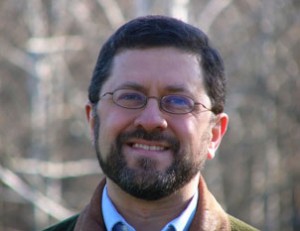
Known as the “Doer”, St. Basil the Great is an extraordinary figure in our Christian heritage.
Our Holy Father, Pope Benedict XVI has said,
Saint Basil the Great, one of the most eminent Fathers of the Eastern Church, showed to all those who wished
to give themselves completely to God the way of monastic life, “where the precept of concretely lived charity becomes the ideal of human coexistence, where the human being seeks God without limitation or impediment†(cf. Orientale Lumen, 9). Saint Basil is for you a model of perfect service of God and the Church. His whole life consisted in the harmonious exercise of the virtue of faith and in acts of practical love in the spirit of the evangelical counsels. Down the centuries the teaching of Saint Basil has borne mature fruits of religious life, especially in the East.
Take a listen to the interview above with Mike Aquilina and learn so much more about this “great” Father of the Church
Tags: faith, mike aquilina, Orientale Lumen, Saint Basil, st. basil the great, st. paul center for biblical theology
This entry was posted on Wednesday, January 2nd, 2013 at 12:05 am
You can follow any responses to this entry through the RSS 2.0 feed.
“Remember always…a tranquil conscience and an assured innocence produce a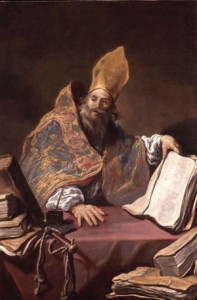 blessed life”
blessed life”
Saint Ambrose (c. between 337 and 340 – 4 April 397), was a bishop of Milan who became one of the most influential Church figures of the 4th century. Mariologist, heresy buster, emperor tamer, lover of hymns, an answer to a mother’s prayer (ask St. Monica), you name it, St. Ambrose fills the bill…
Did you know that St. Ambrose was one of the first recorded instances of someone reading silently? Interesting…
 Did you know that he received, essentially, the sacramental Grand Slam all at once? Wonder what that is?
Did you know that he received, essentially, the sacramental Grand Slam all at once? Wonder what that is?
…well let’s ask Mike Aquilina. Take a listen [powerpress]
For a fuller a rendering of his life, visit New Advent
So, so much from St. Ambrose! First, better to hear from the man himself (sort of…)
On Holy Mary
Next on Holy Repentance
A prayer of St. Ambrose
Lord Jesus Christ, I approach your banquet table in fear and trembling, for I am a sinner, and dare not rely on my own worth but only on your goodness and mercy. I am defiled by many sins in body and soul, and by my unguarded thoughts and words.
Gracious God of majesty and awe, I seek your protection, I look for your healing. Poor troubled sinner that I am, I appeal to You, the fountain of all mercy. I cannot bear your judgment, but I trust in your salvation. Lord, I show my wounds to You and uncover my shame before You. I know my sins are many and great, and they will fill me with fear, but I hope in Your Mercies, for they cannot be numbered.
Lord Jesus Christ, eternal king, God and man, crucified for mankind, look upon me with mercy and hear my prayer, for I trust in You. Have mercy on me, full of sorrow and sin, for the depth of your compassion never ends.
Praise to You, saving sacrifice, offered on the wood of the cross for me and for all mankind. Praise to the noble and precious blood, flowing from the wounds of my crucified Lord Jesus Christ and washing away the sins of the whole world. Remember, Lord, your creature, whom You have redeemed with Your Blood. I repent my sins, and I long to put right what I have done. Merciful Father, take away all my offenses and sins; purify me in body and soul, and make me worthy to taste the holy of holies.
May Your Body and Blood, which I intend to receive, although I am unworthy, be for me the remission of my sins, the washing away of my guilt, the end of my evil thoughts, and the rebirth of my better instincts. May it incite meto do the works pleasing to You and profitable to my health in body andsoul, and be a firm defense against the wiles of my enemies.
Tags: Church, conscience, doctors of the church, father of the church, fathers mike, mercy, mike aquilina, Saint Ambrose, st ambrose, st. paul center for biblical theology
This entry was posted on Friday, December 7th, 2012 at 12:21 am
You can follow any responses to this entry through the RSS 2.0 feed.
Episode 2 – Roots of the Faith: The Mass: the Universal Sign 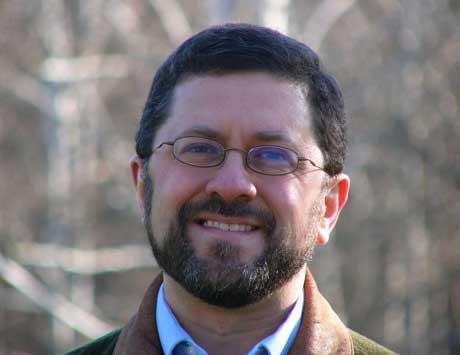
[powerpress]
Roots of the Faith – From the Church Fathers to You with Mike Aquilina, makes clear that just as an acorn grows into a tree and yet remains the same plant, so the Catholic Church is a living organism that has grown from the faith of the earliest Christians into the body of Christ we know today. Hosted by Kris McGregor
Also visit Mike’s “Discerning Hearts” page for more audio downloads and information!
Tags: prayer, st. paul center for biblical theology
This entry was posted on Thursday, October 4th, 2012 at 6:19 am
You can follow any responses to this entry through the RSS 2.0 feed.
Episode 1 – Roots of the Faith: Witnesses to Tradition. A grand overview of Church tradition as passed down to us by the Fathers of the  Church…it’s scope and relevance for our lives today!Â
Church…it’s scope and relevance for our lives today!Â
[powerpress]
Roots of the Faith – From the Church Fathers to You with Mike Aquilina, makes clear that just as an acorn grows into a tree and yet remains the same plant, so the Catholic Church is a living organism that has grown from the faith of the earliest Christians into the body of Christ we know today. Hosted by Kris McGregor
Also visit Mike’s “Discerning Hearts” page for more audio downloads and information!
Tags: mike aquilina, roots of the faith, st. paul center for biblical theology
This entry was posted on Wednesday, September 26th, 2012 at 10:42 am
You can follow any responses to this entry through the RSS 2.0 feed.
The importance of his life and contribution to the Church cannot be overstated. St. Augustine, one of the greatest of the Church Fathers, has not only influenced the Church, but the thought of the world as we know it. The story of his conversion as chronicled in his “Confessions”, would be 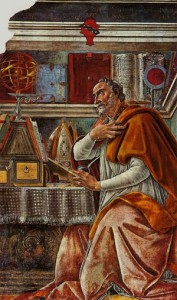 enough, but then add the body of his theological work and you have nothing less than a glimpse of what is truly the power of “grace and mercy”.
enough, but then add the body of his theological work and you have nothing less than a glimpse of what is truly the power of “grace and mercy”.
Mike Aquilina is one of the best at bringing this great saint’s life into perspective.
For a more detail accounting of St. Augustine’s  life, you can visit Lives of the Saints
Spiritual Writings:
-Â ConfessionsÂ
-Â Letters
-Â City of God
-Â Christian Doctrine
-Â On the Holy Trinity
-Â The Enchiridion
-Â On the Catechising of the Uninstructed
-Â On Faith and the Creed
-Â Concerning Faith of Things Not Seen
-Â On the Profit of Believing
-Â On the Creed: A Sermon to Catechumens
-Â On Continence
-Â On the Good of Marriage
-Â On Holy Virginity
-Â On the Good of Widowhood
-Â On Lying
-Â To Consentius: Against Lying
-Â On the Work of Monks
-Â On Patience
-Â On Care to be Had For the Dead
-Â On the Morals of the Catholic Church
-Â On the Morals of the Manichaeans
-Â On Two Souls, Against the Manichaeans
-Â Acts or Disputation Against Fortunatus the Manichaean
-Â Against the Epistle of Manichaeus Called Fundamental
-Â Reply to Faustus the Manichaean
-Â Concerning the Nature of Good, Against the Manichaeans
-Â On Baptism, Against the Donatists
-Â Answer to Letters of Petilian, Bishop of Cirta
-Â Merits and Remission of Sin, and Infant Baptism
-Â On the Spirit and the Letter
-Â On Nature and Grace
-Â On Man’s Perfection in Righteousness
-Â On the Proceedings of Pelagius
-Â On the Grace of Christ, and on Original Sin
-Â On Marriage and Concupiscence
-Â On the Soul and its Origin
-Â Against Two Letters of the Pelagians
-Â On Grace and Free Will
-Â On Rebuke and Grace
-Â The Predestination of the Saints/Gift of Perseverance
-Â Our Lord’s Sermon on the Mount
-Â The Harmony of the Gospels
-Â Sermons on Selected Lessons of the New Testament
-Â Tractates on the Gospel of John
-Â Homilies on the First Epistle of John
-Â Soliloquies
-Â The Enarrations, or Expositions, on the Psalms
For me, out of all the St. Augustine’s work, this is the piece that deeply touches my heart and is one of my all-time favorite prayers:
Late Have I Loved You
A Prayer of Saint Augustine
Late have I loved you, O Beauty, so ancient and so new, late have I loved you!
And behold, you were within me and I was outside, and there I sought for you, and in my deformity I rushed headlong into the well-formed things that you have made.
You were with me, and I was not with you. Those outer beauties held me far from you, yet if they had not been in you, they would not have existed at all.
You called, and cried out to me and broke open my deafness; you shone forth upon me and you scattered my blindness.
You breathed fragrance, and I drew in my breath and I now pant for you.
I tasted, and I hunger and thirst; you touched me, and I burned for your peace.
This prayer is from his book, “Confessions.”
                         Â
Tags: confessions, conversion, fathers mike, grace and mercy, mike aquilina, our sunday visitor, prayer, st augustine
This entry was posted on Tuesday, August 28th, 2012 at 12:22 am
You can follow any responses to this entry through the RSS 2.0 feed.
[powerpress]
St. Maximus the Confessor 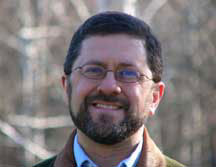 lived approx. 500 years after Hippolytus. He is one of the last fathers of the Church and is consider one of the first of her doctors. A beautiful writer and homelist he said this once:
lived approx. 500 years after Hippolytus. He is one of the last fathers of the Church and is consider one of the first of her doctors. A beautiful writer and homelist he said this once:
The sun of justice, rising into the clean mind, reveals Himself and the reasons of all that He created and will create.
Love defeats those three: self-deception, because she is not proud; Interior envy, because she is not jealous; Exterior envy, because she is generous and serene.
All the treasures of wisdom and knowledge are inside our hearts hidden.
Faith without love does not act in the soul the illumination of the divine knowledge.
When the mind receives the ideas of things, by its nature is transformed according to each and every idea. If it sees the things spiritually, it is transfigured in many ways according to each vision. But if the mind becomes in God, then it becomes totally shapeless and formless, because seeing Him who has one face it comes to have one face and then the whole mind becomes a face of light.–Â taken from Speech on Love
This entry was posted on Monday, August 13th, 2012 at 12:03 pm
You can follow any responses to this entry through the RSS 2.0 feed.
Join Bruce and I as we discuss with Mike Aquilina the powerful and at the same time, poignant witness of the Holy Roman 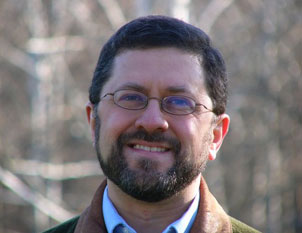 Martyrs[powerpress]
Martyrs[powerpress]
From Mike’s great website The Way of the Matyrs: ROMAN PROTOMARTYRS
Monday June 30th 2008, 10:23 am
Filed under: PatristicsToday’s the feast of the first Roman Martyrs. Theirs is a story you just have to hear. But first we have to backtrack a little bit.
In July of A.D. 64, during the tenth year of Nero’s reign, a great fire consumed much of the city of Rome. The fire raged out of control for seven days — and then it started again, mysteriously, a day later. Many in Rome knew that Nero had been eager to do some urban redevelopment. He had a plan that included an opulent golden palace for himself. The problem was that so many buildings were standing in his way — many of them teeming wooden tenements housing Rome’s poor and working class.
The fire seemed too convenient for Nero’s purposes — and his delight in watching the blaze didn’t relieve anybody’s suspicions. If he didn’t exactly fiddle while Rome burned, he at least recited his poems. Nero needed a scapegoat, and an upstart religious cult, Jewish in origin and with foreign associations, served his purposes well. Nero, who was a perverse expert at human torment, had some of its members tortured till they were so mad they would confess to any crime. Once they had confessed, he had others arrested.
He must have known, however, that the charges would not hold up. So he condemned them not for arson, or treason, or conspiracy, but for “hatred of humanity.â€
To amuse the people, he arranged for their execution to be a spectacle, entertainment on a grand scale. The Roman historian Tacitus (who had contempt for the religion, but greater contempt for Nero) describes in gruesome detail the tortures that took place amid a party in Nero’s gardens.
Mockery of every sort was added to their deaths. Covered with the skins of beasts, they were torn by dogs and perished, or were nailed to crosses, or were doomed to the flames. These served to illuminate the night when daylight failed. Nero had thrown open the gardens for the spectacle, and was exhibiting a show in the circus, while he mingled with the people in the dress of a charioteer or drove about in a chariot. Hence, even for criminals who deserved extreme and exemplary punishment there arose a feeling of compassion; for it was not, as it seemed, for the public good, but to glut one man’s cruelty, that they were being punished.
That is all we know about the first Roman martyrs. We know none of their names. Tacitus doesn’t tell us why they were willing to die this way rather than renounce their faith. Yet this should be an important question for us to consider. Why did the martyrs do this? What prepared them to face death so bravely? To what exactly did they bear witness with their death?
The answers to these questions (and many more) can be found in the rest of the article, at the archive of Touchstone Magazine. The article originated in a talk I gave in Rome in 2005 on the feast of the Roman Martyrs. It’s called “The Roman Martyrs and Their Mass.â€
I also treat the subject in my book The Resilient Church: The Glory, the Shame, & the Hope for Tomorrow.
Tags: catholic, catholic podcast, catholic prayer, cathollc spirituality, Holy Roman Martyrs, martyrdom, martyrs, mike aquilina, Roman Martyrs, rome
This entry was posted on Saturday, June 30th, 2012 at 10:47 am
You can follow any responses to this entry through the RSS 2.0 feed.
Leave it to the wonderfully thoughtful Mike Aquilina to bring us the lives of just some of those glorious maternal nurturers we call “the  Mothers of the Church”.  From the well known Sts. Perpetua and Felicity and St. Monica to lesser known “mothers” like Proba the Poet and St. Olympias, Mike, along with his co-author Christopher Bailey, share their inspiring stories.  Mike Aquilina’s sincere love for these women and the witness they have provided us in our present age helps us to appreciate, once again, what God can do with ordinary people who are open to His extraordinary grace.
Mothers of the Church”.  From the well known Sts. Perpetua and Felicity and St. Monica to lesser known “mothers” like Proba the Poet and St. Olympias, Mike, along with his co-author Christopher Bailey, share their inspiring stories.  Mike Aquilina’s sincere love for these women and the witness they have provided us in our present age helps us to appreciate, once again, what God can do with ordinary people who are open to His extraordinary grace.
[powerpress]
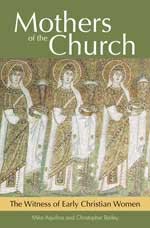 You can find Mike’s book here
You can find Mike’s book here
The Mothers of the Church include:
Holy Women of the New Testament
–St. Blandina
–St. Perpetua and St. Felicity
–St. Helena
–St. Thecla
–St. Agnes of Rome
–St. Macrina
–Proba the Widow
–St. Marcella
–St. Paula
–St. Eustochium
–St. Monica
–Egeria the Tourist
Tags: catholic, catholic podcast, catholic prayer, cathollc spirituality, Church, fathers of the church, mike aquilina, mothers of the church, osv, perpetua, st. paul center for biblical theology, witness
This entry was posted on Friday, June 8th, 2012 at 11:40 am
You can follow any responses to this entry through the RSS 2.0 feed.
The little brother in a family of saints, St. Gregory of Nyssa, would be remembered as “the thinker”. Mike Aquilina shares with us his story,  his role as one of the Cappadocian fathers, and so much more.
Mike Aquilina shares with us his story,  his role as one of the Cappadocian fathers, and so much more.
[powerpress]
Saint Peter’s Square
Wednesday, 29 August 2007Saint Gregory of Nyssa (1)
Dear Brothers and Sisters,
In the last Catecheses, I spoke of two great fourth-century Doctors of the Church, Basil and Gregory Nazianzus, a Bishop in Cappadocia, in present-day Turkey. Today, we are adding a third, St Gregory of Nyssa, Basil’s brother, who showed himself to be a man disposed to meditation with a great capacity for reflection and a lively intelligence open to the culture of his time. He has thus proved to be an original and profound thinker in the history of Christianity.
He was born in about 335 A.D. His Christian education was supervised with special care by his brother Basil – whom he called “father and teacher” (Ep. 13, 4: SC 363, 198) – and by his sister Macrina. He completed his studies, appreciating in particular philosophy and rhetoric.
Initially, he devoted himself to teaching and was married. Later, like his brother and sister, he too dedicated himself entirely to the ascetic life.
He was subsequently elected Bishop of Nyssa and showed himself to be a zealous Pastor, thereby earning the community’s esteem.
When he was accused of embezzlement by heretical adversaries, he was obliged for a brief period to abandon his episcopal see but later returned to it triumphant (cf. Ep. 6: SC 363, 164-170) and continued to be involved in the fight to defend the true faith.
Especially after Basil’s death, by more or less gathering his spiritual legacy, Gregory cooperated in the triumph of orthodoxy. He took part in various Synods; he attempted to settle disputes between Churches; he had an active part in the reorganization of the Church and, as a “pillar of orthodoxy”, played a leading role at the Council of Constantinople in 381, which defined the divinity of the Holy Spirit. (more…)
Tags: catholic, catholic podcast, catholic prayer, cathollc spirituality
This entry was posted on Friday, March 9th, 2012 at 10:41 am
You can follow any responses to this entry through the RSS 2.0 feed.
 Episode 12– The History of the Future
Episode 12– The History of the Future
The Resilient Church with Mike Aquilina, offers a fascinating look at the trials and triumphs of the Catholic Church over the past two thousand years. Fast-paced sketches of critical periods in church history give readers perspective on the challenges faced by the church today. Mike Aquilina does not shrink from the realities of the past, including badly behaved leaders and those who betrayed the Lord. Yet he also leaves us all with well-founded hope for the future: God remains faithful in every circumstance and fulfills his promise to remain with his church always. Hosted by Kris McGregor
Also visit Mike’s “Discerning Hearts†page for more audio downloads and information!
Tags: catholic, catholic podcast, catholic prayer, cathollc spirituality, church history, mike aquilina, Resilient Church, st. paul center for biblical theology
This entry was posted on Monday, November 28th, 2011 at 6:23 am
You can follow any responses to this entry through the RSS 2.0 feed.
 Episode 11– A Century of Cataclysms
Episode 11– A Century of Cataclysms
The Resilient Church with Mike Aquilina, offers a fascinating look at the trials and triumphs of the Catholic Church over the past two thousand years. Fast-paced sketches of critical periods in church history give readers perspective on the challenges faced by the church today. Mike Aquilina does not shrink from the realities of the past, including badly behaved leaders and those who betrayed the Lord. Yet he also leaves us all with well-founded hope for the future: God remains faithful in every circumstance and fulfills his promise to remain with his church always. Hosted by Kris McGregor
Also visit Mike’s “Discerning Hearts†page for more audio downloads and information!
Tags: catholic, catholic podcast, catholic prayer, cathollc spirituality, mike aquilina, Resilient Church
This entry was posted on Sunday, November 20th, 2011 at 10:56 pm
You can follow any responses to this entry through the RSS 2.0 feed.
 Episode 10– The Secular Age
Episode 10– The Secular Age
The Resilient Church with Mike Aquilina, offers a fascinating look at the trials and triumphs of the Catholic Church over the past two thousand years. Fast-paced sketches of critical periods in church history give readers perspective on the challenges faced by the church today. Mike Aquilina does not shrink from the realities of the past, including badly behaved leaders and those who betrayed the Lord. Yet he also leaves us all with well-founded hope for the future: God remains faithful in every circumstance and fulfills his promise to remain with his church always. Hosted by Kris McGregor
Also visit Mike’s “Discerning Hearts†page for more audio downloads and information!
Tags: catholic, catholic podcast, catholic prayer, cathollc spirituality, church history, mike aquilina, Resilient Church, st. paul center for biblical theology
This entry was posted on Monday, November 14th, 2011 at 2:28 pm
You can follow any responses to this entry through the RSS 2.0 feed.
No one, however weak, is denied a share in the victory of the cross.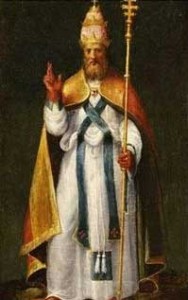
No one is beyond the help of the prayer of Christ.
– St. Leo the Great
How do you stop a barbarian invader like Attila from sacking your town? Pray, pray, pray…just ask St. Leo the Great.
 Take a listen to Mike Aquilina (the “great” son of the Fathers) talk about St. Leo the Great:
Take a listen to Mike Aquilina (the “great” son of the Fathers) talk about St. Leo the Great:
[powerpress]
CNA –Pope Leo the Great is the first Pope whose sermons and letters, many of which were on faith and charity, were preserved in extensive collections. He served as pontiff from 440 until his death in 461. His writing on the Incarnation was acclaimed at the Council of Chalcedon in 451. –
Prior to his pontificate, Leo was a deacon and active as a peacemaker in the Roman Empire. He is most remembered for having successfully persuaded Attila the Hun not to plunder Rome. He was not as successful during
another attack three years later, however. Nevertheless, he managed to save the city from being burnt. He stayed on to help the people rebuild Rome.
He was made a Doctor of the Church in 1754-CNA
This is the chapel/altar area with the tomb of St. Leo in St. Peter’s in Rome. It was restricted to the public for some reason. But I was able to get close, because I went to confession in that area (a very interesting story I’ll share some day).
 Here is the “great” painting by Raphael that is in the Vatican Museum of St. Leo imploring Attilia to back off and change his ways (and he did, go figure)
Spiritual Writings –
 - Sermons
-Â Letters
Tags: catholic, catholic podcast, catholic prayer, cathollc spirituality, council of chalcedon, doctor of the church, fathers mike, pope leo, st leo, vatican museum
This entry was posted on Thursday, November 10th, 2011 at 12:10 am
You can follow any responses to this entry through the RSS 2.0 feed.
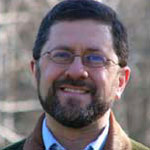 Episode 9– The World Goes Mad
Episode 9– The World Goes Mad
The Resilient Church with Mike Aquilina, offers a fascinating look at the trials and triumphs of the Catholic Church over the past two thousand years. Fast-paced sketches of critical periods in church history give readers perspective on the challenges faced by the church today. Mike Aquilina does not shrink from the realities of the past, including badly behaved leaders and those who betrayed the Lord. Yet he also leaves us all with well-founded hope for the future: God remains faithful in every circumstance and fulfills his promise to remain with his church always. Hosted by Kris McGregor
Also visit Mike’s “Discerning Hearts†page for more audio downloads and information!
Tags: catholic, catholic podcast, catholic prayer, cathollc spirituality, french revolution, mike aquilina, Resilient Church, World Goes Mad Episode
This entry was posted on Sunday, November 6th, 2011 at 5:35 pm
You can follow any responses to this entry through the RSS 2.0 feed.


